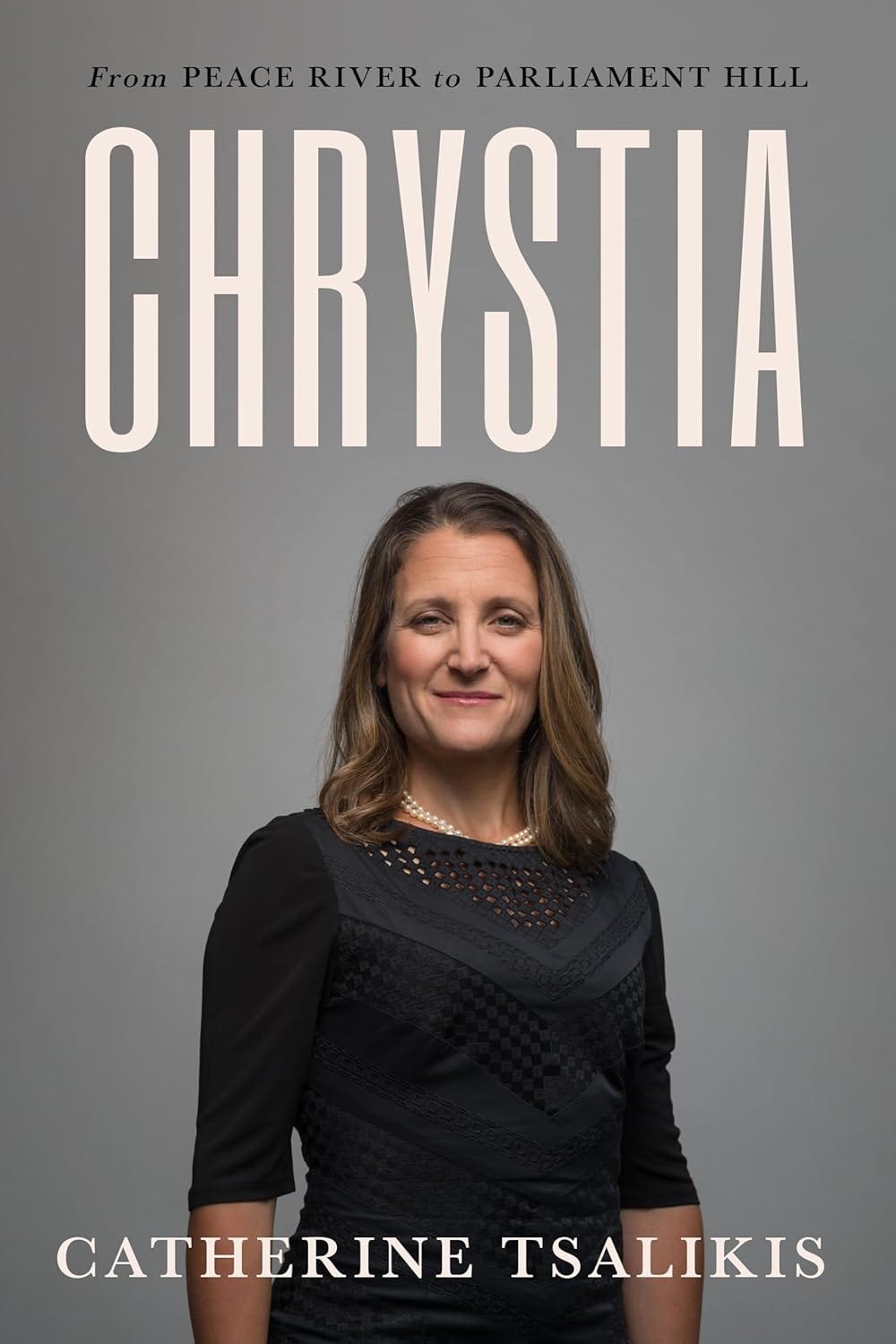In Chrystia: From Peace River to Parliament Hill, Catherine Tsalikis provides a well-rounded portrait of Liberal politician and former journalist Chrystia Freeland’s life, including formative influences, education, and career achievements.
“Tsalikis draws on numerous sources, including magazine and newspaper articles, interviews, Chrystia’s own writings, and other venues, making for a thoroughly researched story.”
Tsalikis draws on numerous sources, including magazine and newspaper articles, interviews, Chrystia’s own writings, and other venues, making for a thoroughly researched story. In the “Notes” section at the end of the book, Tsalikis states that she conducted more than 130 interviews with Chrystia’s relatives, friends, and colleagues between 2021 and 2024, and the depth of research shows. Though plenty of information is conveyed, the content is informative without compromising reader interest.
By providing information about Chrystia’s grandparents and parents, Tsalikis gives us a perspective on some of the formative influences in the future politician’s life. We learn about Chrystia’s educational endeavours, which included a Rhodes scholarship. The book also covers Chrystia’s twenty-year journalism career, which included frontline and management roles at the Financial Times, The Globe and Mail, and Thompson-Reuters, in a variety of venues including London, Moscow, and New York.
Tsalikis tells us how Chrystia got into politics, from the initial exploratory discussions to her by-election win in the Toronto Centre seat vacated by Bob Rae. Chrystia’s political career and major achievements and challenges, such as finalizing the Canada Europe Trade Agreement, re-negotiating NAFTA (now the USMCA), and helping the country deal with the challenges posed by the pandemic, are also highlighted.
Chrystia provides not only the what, but the why and how, delving into Chrystia’s motivations, as well as important attributes that support her success, such as the ability to compartmentalize, the range of global contacts built during her journalism career, and her ability to listen to, and build in, others’ viewpoints. We also get an understanding of some of Chrystia’s thoughts about capitalism, globalism, democracy, and how to counter the “hollowing out” of the middle class.
Tsalikis explores the importance of Chrystia’s Ukrainian roots, and paints a picture of a well-rounded individual who has lived in other parts of the world, and who isn’t afraid to stand up for what she believes in. Chrystia developed a deep knowledge of the Ukraine and Russia, based on time spent there and her coverage of events like the Ukraine’s bid for independence in the early 1990s, and the dissolution of the Soviet Union.
Thanks to Tsalikis’ interviews with those who have seen Chrystia up close (including other politicians, fellow journalists, family members, and former classmates) we get insight into Chrystia the person—what she was like to work with and work for.
Tsalikis makes an effort to be even-handed, sharing positive reflections as well as the viewpoints of some who are critical of aspects of Chrystia’s approach or demeanour. The picture Tsalikis paints is of a woman with ambition, who was deeply dedicated to whatever job she turned her hand to.
But Chrystia is driven by more than ambition. In part because of her mother Halyna’s example, Chrystia is also motivated by the desire to make a positive contribution. She is depicted as someone who can build bridges and make connections, and who has a natural affection for people. Tsalikis notes that even some individuals who disliked Chrystia at the outset of certain endeavours have ended up respecting her abilities.
Chrystia does not shy away from portraying the challenges Chrystia faced as a woman. Unfortunately, in Chrystia’s case as well as others, there have been instances of adverse treatment, mockery, or disrespect simply because of her gender. Nevertheless, Chrystia has persevered despite the obstacles, showing by example what is possible. Strong family support has enabled her to show dedication to her various jobs, which sometimes required extensive travel, while at the same time raising children.
Before reading Chrystia, I knew very little about Chrystia Freeland. Tsalikis’ book provides a better understanding of her motivations and her capabilities, giving the impression of a hard-working, conscientious woman whose disarming nature can make people underestimate her and what she has to offer.
What the future holds for Chrystia Freeland remains to be seen. For those curious about what makes Chrystia Freeland tick, and what she has achieved thus far in her already-impressive career, Chrystia provides useful insights.
About the Author
CATHERINE TSALIKIS is a writer and journalist based in Toronto, covering foreign policy, politics, and gender equality. After completing her undergraduate and graduate degrees at the University of Toronto and the London School of Economics, she worked as an editorial assistant for The World Today magazine, published by Chatham House, and as a politics producer for London’s Sky News. Most recently, she was the senior editor for OpenCanada.org, an award-winning international affairs site.
About the Reviewer
Lisa Timpf is a retired HR and communications professional who lives in Simcoe, Ontario. Her poetry, fiction, creative nonfiction, and book reviews have appeared in New Myths, Star*Line, The Future Fire, and other venues. Lisa’s speculative haibun collection, In Days to Come, is available from Hiraeth Publishing. You can find out more about Lisa’s writing and artwork at http://lisatimpf.blogspot.com/
Book Details
Publisher : House of Anansi Press (Dec 20 2024)
Language : English
Hardcover : 360 pages
ISBN-10 : 1487011210
ISBN-13 : 978-1487011215
.





